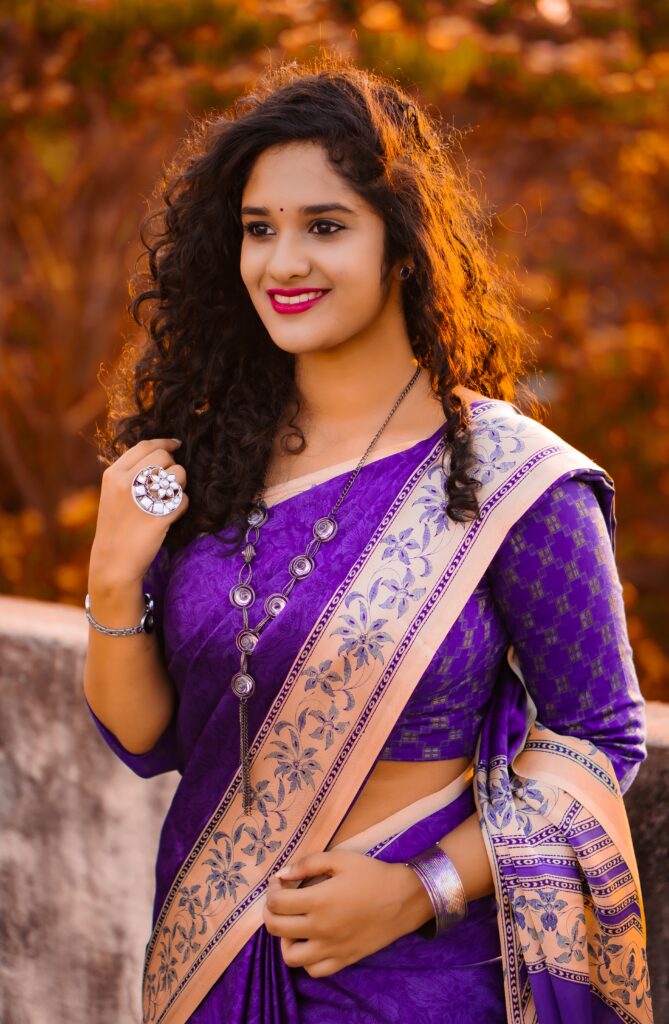- Koorai saree, also known as the Kanchipuram saree or Kanjivaram saree, is a traditional silk saree that is native to the town of Kanchipuram in Tamil Nadu, India. Koorai sarees are handwoven using high-quality silk and are known for their exquisite designs and vibrant colors.
- The saree is characterized by its wide border and pallu, which are intricately woven with gold and silver zari threads. The body of the saree is usually woven in silk and features intricate motifs such as peacocks, temple borders, and checks.
- Koorai sarees are a popular choice for weddings, religious ceremonies, and other special occasions in Tamil Nadu and other parts of India. They are considered to be a symbol of luxury, elegance, and tradition and are highly prized by women who appreciate fine craftsmanship and exquisite designs.
There are several different types of Koorai sarees that are popular in Tamil Nadu and other parts of India. Some of the most popular types are:
- Pattu Koorai Saree: Pattu Koorai saree is made of pure silk and is known for its rich texture and sheen. These sarees are usually heavy and adorned with intricate zari work.
- Vastrakala Koorai Saree: Vastrakala Koorai saree is a more affordable version of the Pattu Koorai saree. It is made of a blend of silk and cotton and features simple designs and motifs.
- Parampara Koorai Saree: Parampara Koorai saree is a traditional Koorai saree that is woven with pure silk and features classic designs such as temple borders, peacocks, and checks.
- Designer Koorai Saree: Designer Koorai sarees are modern versions of the traditional Koorai saree. These sarees feature contemporary designs, bold colors, and unique patterns that cater to the tastes of the younger generation.
- Silk Cotton Koorai Saree: Silk Cotton Koorai saree is a lightweight version of the Koorai saree that is made of a blend of silk and cotton. These sarees are comfortable to wear and are ideal for daily wear or casual occasions.
These are just a few examples of the different types of Koorai sarees available in Tamil Nadu. Each type has its own unique characteristics and is suited for different occasions and tastes.
Disclaimer: The content provided on Incredible Sarees’ blog is for informational purposes only. The information presented is based on our knowledge and understanding of sarees as of September 2023, and it may not reflect the latest trends, styles, or industry updates.
The blog posts on Incredible Sarees are intended to provide general information and guidance regarding sarees, including tips on styling, fabric types, draping techniques, and fashion advice. However, it is important to note that fashion trends are constantly evolving, and individual preferences may vary.
While we strive to ensure the accuracy and reliability of the information provided, Incredible Sarees cannot guarantee the completeness, timeliness, or accuracy of the content. Therefore, we advise readers to use their discretion and consult other reputable sources or professionals for specific recommendations and personalized advice.
Incredible Sarees’ blogs may contain external links to third-party websites or resources. These links are provided for convenience and do not imply endorsement or responsibility for the content or services offered on those websites.
The views and opinions expressed in the blog posts are those of the authors and do not necessarily reflect the views of Incredible Sarees as a whole.
Incredible Sarees reserves the right to modify, update, or remove any content on the blog without prior notice. We also reserve the right to change the focus, format, or content of the blog at any time.
By using the information provided on Incredible Sarees’ blog, you acknowledge and agree to the above disclaimer. We encourage readers to engage with us, share their feedback, and contribute to the discussions respectfully.
For any specific concerns or inquiries regarding the content on Incredible Sarees’ blog, please email us at [email protected]


